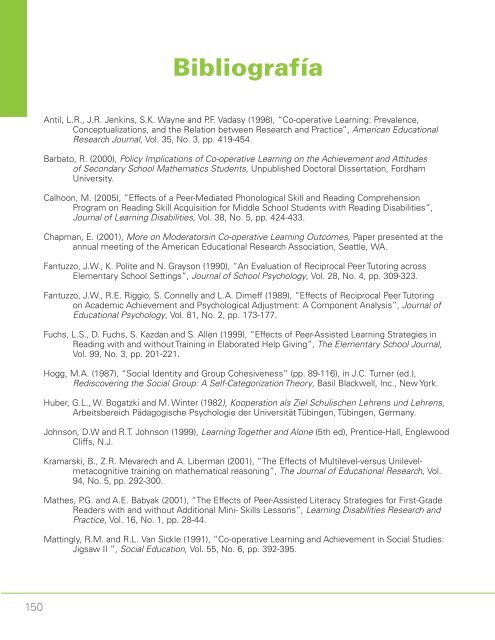del aprendizaje
2aGaJxc
2aGaJxc
Create successful ePaper yourself
Turn your PDF publications into a flip-book with our unique Google optimized e-Paper software.
Bibliografía<br />
Antil, L.R., J.R. Jenkins, S.K. Wayne and P.F. Vadasy (1998), “Co-operative Learning: Prevalence,<br />
Conceptualizations, and the Relation between Research and Practice”, American Educational<br />
Research Journal, Vol. 35, No. 3, pp. 419-454.<br />
Barbato, R. (2000), Policy Implications of Co-operative Learning on the Achievement and Attitudes<br />
of Secondary School Mathematics Students, Unpublished Doctoral Dissertation, Fordham<br />
University.<br />
Calhoon, M. (2005), “Effects of a Peer-Mediated Phonological Skill and Reading Comprehension<br />
Program on Reading Skill Acquisition for Middle School Students with Reading Disabilities”,<br />
Journal of Learning Disabilities, Vol. 38, No. 5, pp. 424-433.<br />
Chapman, E. (2001), More on Moderatorsin Co-operative Learning Outcomes, Paper presented at the<br />
annual meeting of the American Educational Research Association, Seattle, WA.<br />
Fantuzzo, J.W., K. Polite and N. Grayson (1990), “An Evaluation of Reciprocal Peer Tutoring across<br />
Elementary School Settings”, Journal of School Psychology, Vol. 28, No. 4, pp. 309-323.<br />
Fantuzzo, J.W., R.E. Riggio, S. Connelly and L.A. Dimeff (1989), “Effects of Reciprocal Peer Tutoring<br />
on Academic Achievement and Psychological Adjustment: A Component Analysis”, Journal of<br />
Educational Psychology, Vol. 81, No. 2, pp. 173-177.<br />
Fuchs, L.S., D. Fuchs, S. Kazdan and S. Allen (1999), “Effects of Peer-Assisted Learning Strategies in<br />
Reading with and without Training in Elaborated Help Giving”, The Elementary School Journal,<br />
Vol. 99, No. 3, pp. 201-221.<br />
Hogg, M.A. (1987), “Social Identity and Group Cohesiveness” (pp. 89-116), in J.C. Turner (ed.),<br />
Rediscovering the Social Group: A Self-Categorization Theory, Basil Blackwell, Inc., New York.<br />
Huber, G.L., W. Bogatzki and M. Winter (1982), Kooperation als Ziel Schulischen Lehrens und Lehrens,<br />
Arbeitsbereich Pädagogische Psychologie der Universität Tübingen, Tübingen, Germany.<br />
Johnson, D.W and R.T. Johnson (1999), Learning Together and Alone (5th ed), Prentice-Hall, Englewood<br />
Cliffs, N.J.<br />
Kramarski, B., Z.R. Mevarech and A. Liberman (2001), “The Effects of Multilevel-versus Unilevelmetacognitive<br />
training on mathematical reasoning”, The Journal of Educational Research, Vol.<br />
94, No. 5, pp. 292-300.<br />
Mathes, P.G. and A.E. Babyak (2001), “The Effects of Peer-Assisted Literacy Strategies for First-Grade<br />
Readers with and without Additional Mini- Skills Lessons”, Learning Disabilities Research and<br />
Practice, Vol. 16, No. 1, pp. 28-44.<br />
Mattingly, R.M. and R.L. Van Sickle (1991), “Co-operative Learning and Achievement in Social Studies:<br />
Jigsaw II ”, Social Education, Vol. 55, No. 6, pp. 392-395.<br />
150


